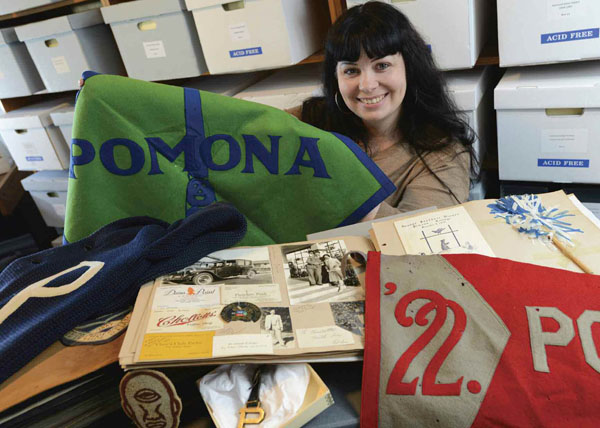
Day after day, the fragments of Pomona’s past find their way to archivist Jamie Weber. Dance cards and football tickets, patches and pins, student diaries, faculty papers, and presidential letters—Weber pores over and processes box after box of Pomoniana, often surprised by what she finds in the historical record of campus life.
The skeleton, though, was a bit of a shock. Paging through the donated scrapbook of Susan Shedd, Class of 1918, Weber came across bony animal remains folded in paper. A note, which Weber read only after opening, explained that they were the remains of a frog dissected in biology class. And then there were the professor’s grade books from the 1920s that a long-ago student happened across while working in a basement lab—and decided to swipe. The thievery may well have preserved them for posterity, since he turned the books over to the archives decades later.
Whether handling old bones, stolen tomes or key documents, Weber’s job is to prevent the College’s history from slipping away. She started at Pomona nearly three years ago, working with Director of Donor Relations Don Pattison to preserve the College’s historical record. Since then, Weber has been processing the papers of presidents and distinguished faculty, staff and alumni; photographs; and all manner of keepsakes.
“I get phone calls from all over campus: ‘I have this box. It was here when I moved into this office 30 years ago. I don’t know what it is and I don’t know what to do with it.’”
Weber does: Remove metal fasteners. Separate newsprint from photos. Sheath photos in Mylar. Put textiles in acid-free tissue. Record the items in the database. Create a finding aid.
All in all, the materials she has processed already take up more than 200 linear feet on campus, housed in a variety of temporary storage areas. The backlog, however, is daunting. Many of the archival treasures of Pomona and the other Claremont Colleges are held at Honnold Library, where Weber, an honors graduate of Pitzer with an MLIS from San Jose State, worked before joining the staff at Pomona. But space at Honnold is limited, and Weber’s new role arose from Pattison’s realization that Pomona needed a professional archivist to take charge of its ever-growing trove of historical materials.
She started off doing triage, dealing with things that were the oldest and most in need of preservation, including damaged items—damp basements and vermin are the archivist’s bane. Her base is in the Sumner Hall office the late David Alexander occupied as president emeritus. There he had stored correspondence from his 22-year tenure, along with letters from previous presidents including Wilson Lyon and James Blaisdell.
The Alexander collection was the first to be completed, processed and entered into a professional database, making its content accessible for scholarly use. His papers provide background on the College’s decision to divest of its stocks in companies doing business in South Africa in the 1980s, and on the creation of the Chicano/Latino Student Affairs Center, among other topics.
Other papers, including those of the late professors Fred Sontag and Corwin Hansch, have since been added to the archives. Now Weber is working on Nu Alpha Phi materials offered by alumni concerned about their care. Other items arrive from far beyond campus, sometimes the gift of a graduate or heir who wants that box of college memorabilia from the attic to get into the right hands. Wherever it comes from, this slice-of-life material is some of the most evocative, says Weber.
“Sure am having lots of fun here, too much in fact,” reads a letter recently donated by a man whose grandfather corresponded with a buddy in Pomona’s Class of 1931. “Since I’ve been here I can’t get to bed till after 12 and have to get up a [sic] five.”
Fascinating stuff, but does the thought of getting too much Pomona paraphernalia keep Weber up at night? She has wondered whether she will eventually be overrun with material. Still, Weber, archivist that she is, won’t risk letting items get away. “My attitude is, bring it,” she says. “We’ll find a way.”
